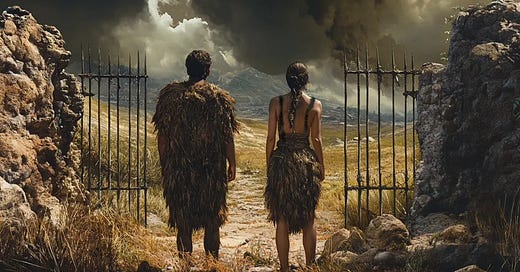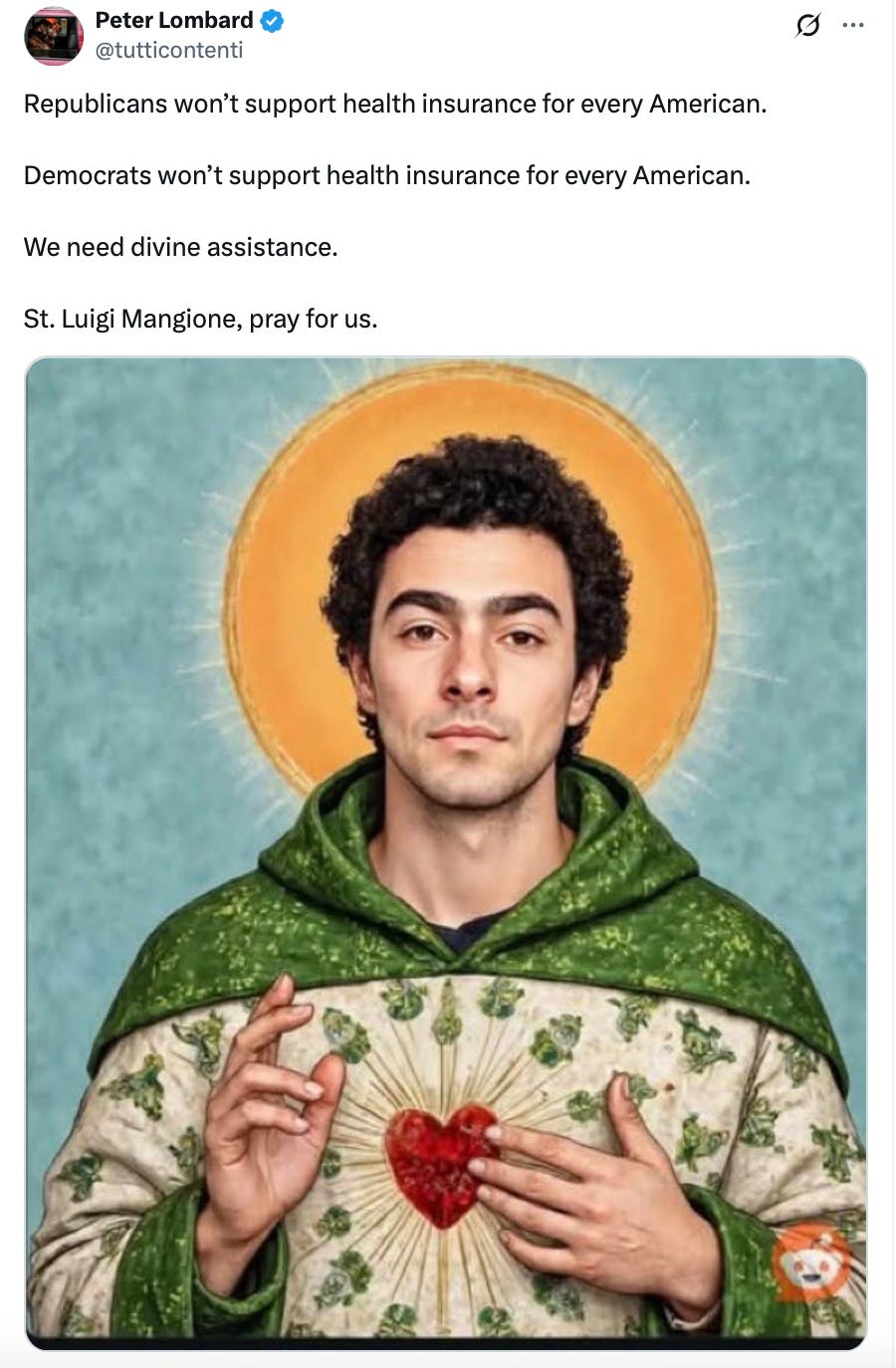News came recently that the US Attorney General is seeking the death penalty for Luigi Mangione, the man charged with the cold-blooded murder of UnitedHealth Care CEO, Brian Thompson. After the senseless and brazen killing shocked America just before Christmas last year, pundits everywhere gave their guesses at what drove Mangione to lie in wait and then gun down a perfect stranger.
Internet sleuths scoured his online footprint, finding hints about recent back surgery but no evidence that he was motivated by denied insurance claims. He may have used psychedelics. Something had definitely happened to him. His family said he had gone to ground – his mother listed him as a missing person with San Francisco police in November. Was he radicalized by pain? On a psychotic break? Taking time out to plan a devilish deed? Mangione has pleaded not guilty to all charges.
After the initial shock at such an unprovoked attack subsided, a new explanatory consensus formed online and in opinion pieces across America. Far from unanimity that someone should forfeit his liberty or life if he wilfully killed an innocent man, in this case, they weren’t so sure. Thompson kinda deserved it, they proposed. He was part of the “barbarism” of the American insurance system–which holds sick people to ransom–for personal gain. Mangione was only trying to make things right. A note found on him at his arrest confirms that line of thinking: “I do apologize for any strife of traumas but it had to be done. Frankly, these parasites simply had it coming.”
At the New York Review, Mark O’Connell wrote of the change of tone in the discussion around Thompson’s killing: “It no longer seems quite so clear that murder is bad, or at any rate that people universally believe it to be so…It’s hard to think of a high-profile murder case where there has been less public sympathy for the victim.” Indeed, vulgar AI-generated images of Mangione as a saint began circulating online within days of the murder. Fans sold shirts with messages found written on the bullet casings at the murder scene: deny, defend, depose. Those words are apparently used by insurers to turn down claims.
Mangione may have been wanting to use his privileged upbringing for good, but the Robin Hood story rings even more hollow when you know that Thompson was not from wealth but worked his way from country Iowa to manage one of America’s biggest companies.
I was thinking about the troubling rise in political violence over the last few years as I was contemplating Gurwinder's interesting insight into Mangione’s motivation. Reflecting on their past interactions, Gurwinder says Mangione was convinced that “modern life is taking away people’s agency.” Using the example of a Non-Player Character–figures in video games that operate on preset scripts–Mangione believed people everywhere were “becoming NPCs, increasingly living their lives as a series of reflex reactions rather than consciously choosing their behaviors.” If the rioting and racially-charged confrontations of the last decade are an indicator, it would seem that violence is seen as a valid course of action – at least you chose it, I guess.
Mangione has a point. Much has been said about the dehumanizing effects of modern life. You don’t have to contemplate too long to recognize that the complex systems that keep our society ticking over are not human-scaled. Even works from early in the industrial age such as Fritz Lang’s Metropolis (1928) and E.M. Forster’s The Machine Stops (1909) —which I discussed in MM Issue 106— critique the plight of men against the system and its managers. The faceless machine has a knack for leaving us powerless to secure its help nor even to influence its workings. Even though we now benefit from the dizzying achievements of a digital age, we have not been shielded any more than our forebears from the relentless imposition of technology and the whims of the managerial class that wields it.
But zooming in further—past the ubiquity of technology we don’t understand but must engage with, like smartphones, digital communication, and electronic money—we find ourselves living in a time when language itself is manipulated to wrest away agency to speak and think clearly. The elite penchant for policing speech forms a mind-bending algorithm that operates in real time. Think about the definition of “harm,” which has expanded so much as to become almost meaningless. The same erosion has happened with kindness, justice, truth, even evil. Meanwhile, new harms like “misgendering” or “systemic racism” have been introduced. Acknowledging your “privilege” is framed as virtue; denying “reproductive justice” is painted as the height of wickedness. Would Mangione have stepped back from his plan if he knew, as others do, that the US health care system is heavily regulated and the outcomes are determined as much by policymakers as by the people who run insurance companies? Would it have made any difference if he had realized he may have been thinking thoughts incepted into his mind for nefarious purposes?
This newspeak, seeded throughout public discourse, has tangled the naive in a trap of moral equivalence. The accompanying newthink comes with its own hierarchy of crimes. Apparently, the healthcare debate has been delayed so long that Mangione’s act of violence is now seen as comprehensible. Congresswoman Alexandria Ocasio-Cortez reflected this equivalence when she stated, "This is not to say that an act of violence is justified, but I think for anyone who is confused or shocked or appalled, they need to understand that people interpret and feel and experience denied claims as an act of violence against them.”
Political violence, of course, is as old as civilization. But is a denied insurance claim truly an “act of violence”? This goes beyond moral equivalence—this is straight-up manipulation. When language and action become confused, the connection between feelings about the world and the reality of the world itself is warped almost beyond recognition. In his catalogue of rising leftist political violence, Noah Rothman quotes Jean-Paul Sartre who paints a brutal picture of the choice created by life together: “Either one must remain terrified or become terrifying.” You are a victim. They are responsible. It sounds plausible and fuels the flames of outrage, but to give in to this delusion is to be played.
I must zoom in one more time. Even if you manage to resist the linguistic uniform pressed upon you; if you see through the disorienting, zero-sum game of woke moral equivalence, you still have to reckon with something deeper: your own sinful nature. In a time when objective truth is mocked and shoved aside, can you even trust your own moral compass? As saints, we know the war within. We know we are not truly free agents; our desires are twisted by sin, the world and the devil. We feel what St Paul felt: “I do not do the good I want, but the evil I do not want is what I keep on doing... who will deliver me from this body of death?” (Romans 7). Would things be different for Mangione if he had come to peace with his own slavery to sin and sought refuge in the forgiveness of Jesus?
I’m definitely partial to running water, antibiotics, electricity, and all the rest—modern technology has placed helpful buffers between us and the raw uncertainty of physical survival. But we’ve become victims of our own success. We’ve come to believe we should be out of reach of all deprivation, conflict, or suffering. There’s a fanciful vision of humanity—especially among the comfortable—that every injustice can be solved through human agency. Pain and death are just the final bugs to patch. But that logic collapses under real suffering. And when it does, we look for someone to blame—The Machine, The Managers, The System. We look to Things to shore up some bulwark against a life forced on us–money, influence, beauty, or perhaps manipulation, political power and violence. But they will all fail.
The tension between the justice we long for and the brokenness we see in the world—and in ourselves—is enough to make a man snap. But we humans speak of how things should be because everything in creation reminds us—we began in Paradise and we yearn to return. Faced with that tension, we arrive at a fork in the road. Either we dig in to our pride: deny our sinfulness, defend our own righteousness, and depose the very grace that would save us. Or we face reality: true agency is only possible when we deny ourselves, depose sin, and defend the truth. That is a beginning of what it means to truly be free.
It is time to grow all the way up, not a victim of the system or its managers. It’s time to become men, in the likeness of Jesus. It’s time to accept what lies beyond our control and labor for what is good within it.
“In this world you will have tribulation. But take heart; I have overcome the world.” (John 16:33)
“For when you were slaves of sin, you were free in regard to righteousness. What fruit did you have then in the things of which you are now ashamed? For the end of those things is death. But now having been set free from sin, and having become slaves of God, you have your fruit to holiness, and the end, everlasting life. For the wages of sin is death, but the gift of God is eternal life in Christ Jesus our Lord.” (Romans 6)







Thank you Pastor. History truly rhymes and we are at the bottom of the curve. Live for the next generation and act as though your external life depends in it.